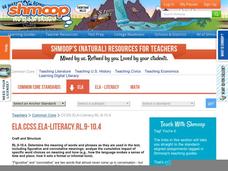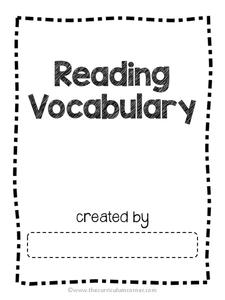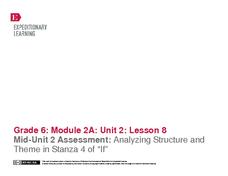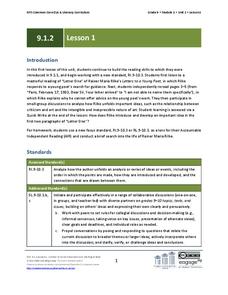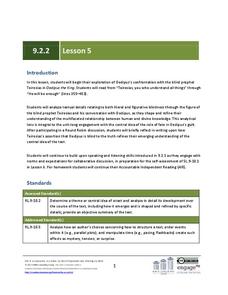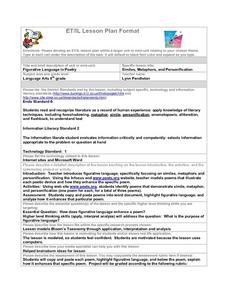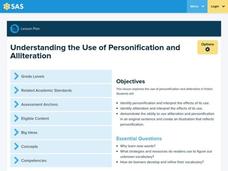Curated OER
I Have a Metaphor
Learners locate the literary devices used in Martin Luther King Jr.'s "I Have a Dream" speech. In this figurative language lesson plan, young scholars first distinguish between similes, metaphors, analogies, personification, etc....
Shmoop
ELA.CCSS.ELA-Literacy.RL.9-10.4
The fourth standard for reading literature in the Common Core calls for young readers to be able to determine the figurative and connotative meanings of words and phrases. Use this resource, a continuation of a series of Common Core...
Florida Center for Reading Research
Vocabulary: Words in Context, Pun Fun
Scholars explore a variety of texts to locate wordplay. Partners read their selections and discuss meanings.
Curriculum Corner
Academic Reading Vocabulary
From A to Z, learners define, draw, and find examples of specific reading focus skills in an alphabetized reading vocabulary packet. Words include dialogue, theme, text structure, genre, paraphrase, and many more.
Carolina K-12
What Is the American Dream?
How do you describe the American Dream? What motivates others to immigrate to the United States, and why do some groups have trouble attaining the American Dream? Your learners will consider these questions as they explore figurative...
Lincoln Public Schools
Developmental Strokes: Pre-Writing Worksheet
Young writers develop their fine motor skills one stroke at a time with this simple tracing worksheet. Looking at pictures of eight basic figures ranging from horizontal and vertical lines to circles and triangles, children practice...
Wasatch County School District
Context Clues
Using context clues is an effective way to define unfamiliar words. Encourage elementary learners to look at the sentences around the word in question, with a short informative slideshow presentation.
EngageNY
Grade 9 ELA Module 1, Unit 1, Lesson 7
A story about feral girls raised by werewolves will have some interesting character development! Track how the girls and their teachers act, speak, and change with a lesson focused on Karen Russell's "St. Lucy's Home for Girls Raised by...
K12 Reader
Alliteration Adventures
Assign a instructional activity to reinforce the literary device of alliteration. Scholars choose a letter, brainstorm a variety of nouns, verbs, and adjectives that begin with that letter, then write three sentences using the words they...
Curated OER
Of Mice and Men by John Steinbeck: Animal Imagery
Why does Steinbeck use animal imagery to describe Lennie in Of Mice and Men? Readers examine a series of descriptions and comment on the effect Steinbeck creates with his word choice.
EngageNY
Analyzing Structure and Theme in Stanza 4 of “If”
Here is a lesson that provides scholars with two opportunities to stretch their compare-and-contrast muscles. First, learners compare and contrast their experience reading the fourth stanza of If by Rudyard Kipling to listening to the...
EngageNY
Grade 9 ELA Module 1, Unit 2, Lesson 1
Where does a writer find inspiration? "Go into yourself," says Rainer Maria Rilke in "Letter One" from Letters to a Young Poet. Readers of Rilke's letter to Franz Xaver Kappus examine the words and figurative language Rilke uses to...
EngageNY
Grade 9 ELA Module 2, Unit 2, Lesson 2
Continue a thoughtful analysis of Sophocles' Oedipus the King by discussing the importance of dialogue within the play's structure. Ninth graders examine how Oedipus speaks about himself to his subjects and Creon before recording their...
EngageNY
Grade 9 ELA Module 2, Unit 2, Lesson 5
Oedipus may be the king, but he certainly does not rule—or see—all. Analyze his interaction with Teiresias in an instructional activity focused on the central idea of Sophocles' Oedipus the King. As pairs of ninth graders discuss...
Curated OER
Rosencrantz and Guildenstern Are Dead: Concept Analysis
Make sure you are well-informed before embarking on a study of Rosencrantz and Guildenstern Are Dead. This resource includes an analysis of the text that a teacher can use to prepare a unit of study. It covers plot elements, themes,...
Curated OER
Two Greedy Bears
Improving listening comprehension skills is the goal of this language arts instructional activity. Young readers listen to the story Two Greedy Bears, stopping to have discussions with a partner. They predict outcomes and make inferences...
Mary Pope Osborne, Classroom Adventures Program
Mummies in the Morning Egyptian pyramids, hieroglyphics
Visit the Magic Treehouse and take your class on a trip through time with a reading of the children's book Mummies in the Morning. Using the story to spark an investigation into Egyptian culture, this literature unit engages...
Curated OER
Lesson Three: Go Free or Die
Fourth graders look for sensory details and figurative language. In this reading strategy lesson, 4th graders read the story Go Free or Die by J. Ferris and complete a chart with figurative language. They use a word wall in the class to...
Curated OER
Similes, Metaphors, and Personification
Eighth graders explore figurative language, specifically focusing on similes, metaphors and personification. They work on the web to identify poems that demonstrate simile, metaphor, and personification, then analyze how it enhances...
Curated OER
Lord of the Flies: Figurative Language
In this Lord of the Flies worksheet, students write whether given examples are simile, metaphor, personification, or hyperbole, and tell how they know.
Curated OER
Reading Examples
Young writers read excerpts from Gary Paulsen's memoir to identify figurative and literal language that contain sensory details. They determine which selections are examples of sensory language and fi the language is used literally or...
Curated OER
Review of Personification and Alliteration
Learners review personification and alliteration. In this literary devices lesson, students use personification and alliteration in a sentence. Learners draw a picture reflecting personification.
Curated OER
"Knot" the Whole Truth: Writing a Modern-Day Story with a Tall Tale's Voice
Beyond Paul Bunyan and his blue ox, tall tales can be a great way to teach young writers about word choice and voice in their writing. Using Jerry Spinelli's Maniac Magee and the Six-Trait Writing process, they begin to write their own...
Curated OER
Pride and Prejudice: Biopoem
Describe yourself or a character from Jane Austen's Pride and Prejudice with a biopoem activity. Using the provided format, kids write their own characteristics or the character traits from the novel to create a poetic portrait.



